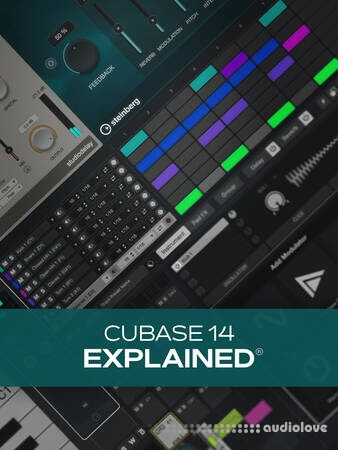Groove3 Cubase 14 Explained

If you're new to Cubase 14 and are ready to start recording your own music, then this Cubase course is for you. Gary Hiebner guides you through every step of this Cubase video tutorial series, from setting up your audio interface and creating your first project to exporting your final song. Along the way, you'll learn tons of invaluable skills, from recording audio and MIDI to using buses, effects, and automation; programming drum parts; editing; navigating your session; and much more. These videos are designed for new Cubase 14 users.
Gary begins by welcoming you and showing you how to create your first Cubase 14 project, including setting up your audio interface inputs/outputs, adjusting your sample rate and buffer size, and connecting your MIDI devices.
Next, you'll explore the Master Control Strip, where you'll find some basic, broad-stroke controls for tonal shaping, tuning, and more. Then it's on to the Model Control Strip, which affords you control over the physical elements of the pianos as well as some synth-style filtering, among other things.
Next, you'll explore the process of creating tracks, adding rack instruments (MIDI instruments), setting up the project tempo, and recording your first MIDI tracks. You'll then learn how to quantize (correct timing errors) the recorded MIDI and even see how to quantize automatically while you're recording if necessary. Then you'll learn how to edit your parts, which includes trimming, duplicating, adjusting velocities (the loudness of each note played), and more.
There's so much more as well, including the Arranger tools (Range, Scissors, Glue, Mute, etc.), Key Editor (for editing the pitch and length of MIDI notes, etc.), using CC controllers (to edit various MIDI instrument parameters like velocity, modulation, and more), Drum Editor (for editing drum parts), Pattern Sequencer (for creating drum patterns and altering the playback in various ways), different record modes (new part, merge, replace, etc.), importing audio (included content or your own), comping (recording several takes and then compiling one from the best bits of each), using insert and send effects (reverb, delay, etc.), automation (controlling various parameters, such as volume or panning, over time automatically), and more!
Using Cubase 14 for the first time can be quite intimidating, and it's easy to get frustrated. With this course, you'll get started on the right foot and have a lot of fun learning in the process. By the end of the course, you'll be absolutely ready to start (and finish!) your first song from start to end. See the individual Cubase 14 video tutorial descriptions for more information on everything that's covered and how you can get going right away. Begin your Cubase journey today... Watch "Cubase 14 Explained®" today!
What You Will Learn:
-Creating your first project and setting up your hardware (audio interface, MIDI devices).
-Recording and editing audio and MIDI tracks.
-Adding effects like reverb, delay, compression, equalization, etc.
-Exporting your finished song to share with the world.
-And so much more!
Home page
DOWNLOAD
